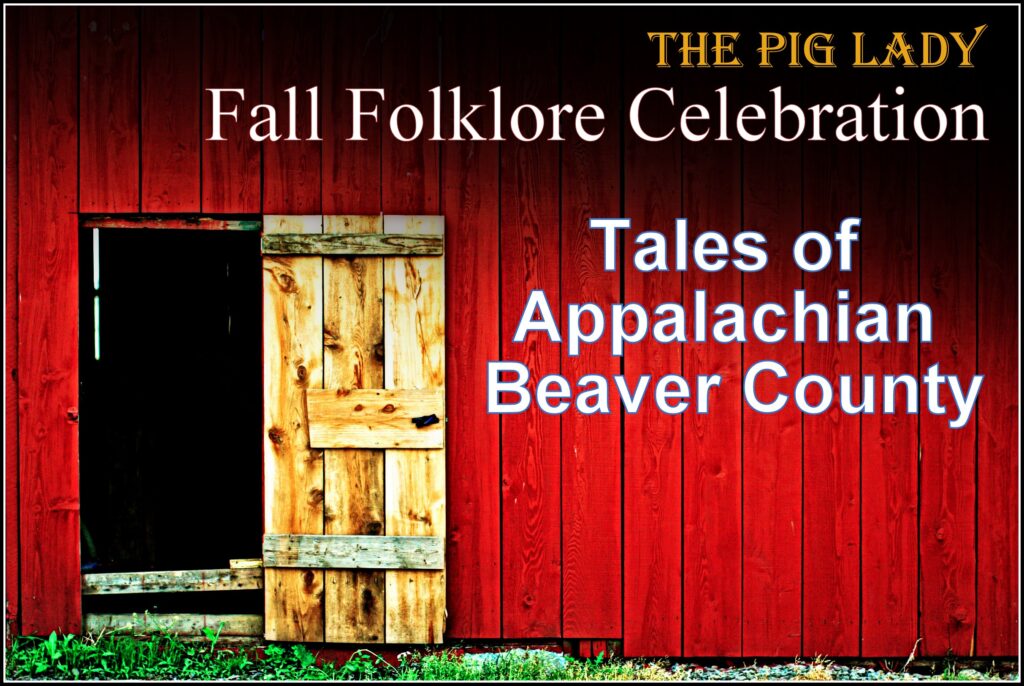Appalachian Beaver County
Folklore
What is folklore?
Folklore is our cultural DNA. It includes the art, stories, knowledge, and practices of a people. While folklore can be bound up in memory and histories, folklore is also tied to vibrant living traditions and creative expression today.
In the United States at least, we often think about “folklore” as something untrue (“Oh, that’s just folklore!”) or something old fashioned that’s no longer a regular part of everyday life (“nobody does that stuff anymore”). But if you think about it a little differently, folklore is and does so much more!
From the perspectives of the people who study folklore and partner with communities to present and preserve it, folklore is one of the many ways we communicate who we are. Often–but certainly not always–rooted in the past, folklore is one of the ways we share with each other the things we see as vital and important. It is a central, every-day part of life and how we make sense of the world today, and it is at the heart of all cultures–including whatever culture we call our own–throughout the world. Folklore is a fundamental part of what it means to be human. ~ American Folklore Society
As Craig Dominey writes online in The Moonlit Road, “Appalachian culture and folklore helped build community spirit. For instance, communal activities like corn shuckings, house raisings, and log rollings brought people together. But mountain dances were the most popular gathering spots, frequently called “play parties” if the local church didn’t approve of dancing. Fiddlers, accompanied by banjo and dulcimer, would play humorous and plaintive ballads reminding the settlers of their homelands. Occasionally, the musicians played narrative folksongs of local legends, fairy tales, and ghost stories. Therefore, many ghost stories, songs, superstitions, and folk remedies considered “Appalachian folklore” can actually be traced back to places like Scotland or Ireland. For instance, settlers would share tales of Scottish haints and Irish fairies, then adapt them into Appalachian stories over generations. Of course, physical and cultural isolation kept many of these Appalachian folklore traditions alive well into the 20th century.”
On the Darker Side of Folklore
Superstitions
Never close a knife you didn’t open, or you’ll have bad luck for 7 years.
Keep a penny in your washer.
Always go out the same door you came in.
New Years: For good luck, eat black eyed peas or collard greens with hog jaw on New Year’s Day. Also, eat pork and sauerkrauts. Don’t wash clothes on New Year’s Day or you will wash a family member out. Don’t sleep on New Year’s.
Don’t do any canning or gardening on your period.
Plant your crops under the full moon.
Don’t walk under a ladder. If you find yourself under one, don’t turn around – back up.
Don’t let anyone sweep under your feet.
Never give someone a set of knives as a gift. If you give them to newlyweds, it will cut their love!
If a black cat crosses your path, turn and go a different way.
Salt: Never repay salt that you have borrowed. If you spill salt, throw a pinch over your left shoulder so you won’t have bad luck.
If a bad storm is coming, put a 2-edged axe into a stump facing the storm to ensure the storm goes around you.
When you drop your fork, it means a woman is coming to visit. If you drop a knife, a man is coming to visit.
Don’t cut your baby’s hair before their first birthday.
Your baby has to fall off the bed before their first birthday.
Run a chicken over your baby to keep if from getting chicken pox.
Don’t let a pregnant woman see a dead person or the baby will have a birth mark.
If cows are laying down, or leaves are upside down, it’s going to rain.
Hang a horseshoe upside down to keep good luck from running out.
Wear a buckeye in your bra to ward off rheumatism.
Hold your breath when you pass a cemetery, or you’ll be the next to die.
If you see a white horse, you’ll have good luck.
Hold your feet up when you’re crossing a railroad track, or you’ll lose your boyfriend.
If you’re walking with someone you have to go on the same side of a post or obstacle, or it will break your friendship.
Don’t wash clothes on Sunday.
If your nose is itching, it means company is coming. If your palm is itching you’re going to get money.
Open the window when someone dies and cover the mirrors so that their soul can leave.
Hang a mirror by the door to protect against evil.
Never leave a rocking chair rocking, or you will invite spirits.
Source: Amy Lewis, Blueridge Mountains Travel Guide
Beaver County Legends & Lore
“The General” of New Brighton
John Irwin of Center Township
Hitchhiking Woman of Stoops Ferry Hill
Crying Woman of Watt’s Mill
The Old Rochester High School
Mt. Caramel Cemetery (Center Township)
Preacher’s Point
Old Economy Villiage
Greersburg Academy (Darlington)
Kelly Rd/Mystery Mile (Ohioville)
Witches Hollow (Independence Township)
Links Bridge
Cannelton Rd.

You must be logged in to post a comment.